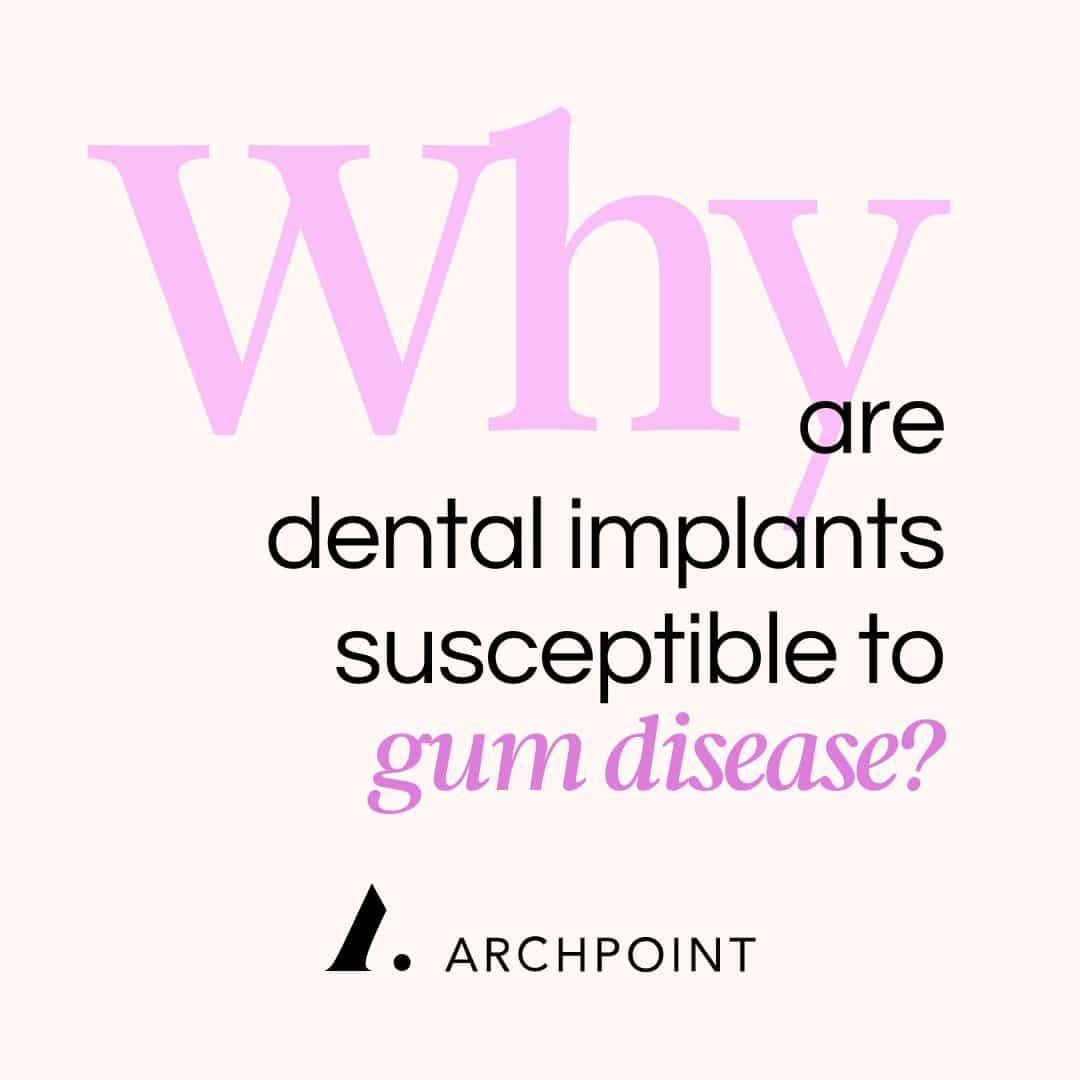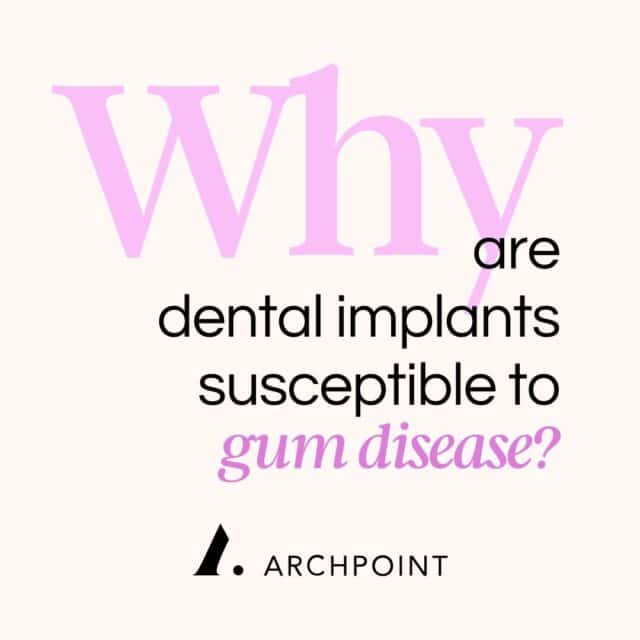
At ARCHPOINT Implant Dentistry in Dallas and Fort Worth, we pride ourselves on providing the highest qualityimplant dentistry in the DFW area. The decision to have dental implants can provide you with life-changing benefits by replacing missing teeth in the strongest, most natural-looking way. With dental implants, you can enjoy all the food you loved before losing teeth and smile with confidence again. Implants also eliminate the need for cumbersome or uncomfortable dentures and messy adhesives.
DFW dental implants can last a lifetime when taken care of properly, but just like natural teeth, they are also susceptible to plaque and gum infections. The implant specialists of ARCHPOINT want to ensure your dental implants last as long as possible. Understanding how they work and how to protect them is necessary to keepyour implants for a lifetime.
What is the Leading Cause of Natural Tooth Loss?
Missing teeth not only changes the appearance of your smile but also affect the foods you can eat and can damages your self-confidence. While tooth loss often occurs due to decay or injury, the most common cause for losing teeth is gum disease or “periodontitis.” Also known as periodontal disease.
What is Periodontal (Gum) Disease?
Gum disease begins as an inflammation of the gingival tissue around your teeth. Harmful bacteria left behind after brushing or flossing irritate surrounding tissues, causing the gums to become red and swollen. As bacteria continue to accumulate, an infection forms and begins to attack the bone that anchors the teeth into place. When left untreated, bone loss becomes more severe and leads to eventual tooth mobility and loss. It’s estimated that 120 million Americans have suffered from tooth loss due to periodontal disease, and that number will most likely increase over the next decade.
Understanding How Dental Implants are Anchored
Dental implants provide a permanent solution to tooth loss by utilizing the most durable and biocompatible materials available. A titanium screw-like implant is surgically placed into the jaw bone tissue, essentially becoming a new tooth root. Titanium immediately triggers the process of integration, fusing to the bone tissue permanently. The entire integration process takes about three months, and provides a bite capability stronger than a natural tooth.
Once your titanium implant has fully fused to the bone tissue, a custom designed porcelain crown is anchored to it via an abutment, resulting in a natural looking and natural feeling tooth replacement.
However, healthy gum and bone tissue are essential for this integration process to take place.
Can Gum Disease Affect a Dental Implant?
While dental implants are resistant to decay, they are still susceptible to periodontal disease. Similar to natural teeth, dental implants need to be brushed and flossed daily to remove the build-up of harmful plaque. When good home care practices are not maintained, infection can easily begin to destroy the tissue that anchors your implant in place. When periodontal disease affects a dental implant it is referred to as “peri-implantitis.” Because peri-implantitis is relatively painless, you may not be aware that your implant is at risk until it is too late.
Having dental implants does not mean that you are going to get peri-implantitis. This gum infection is completely avoidable with good home care and easily treatable if caught early. The implant experts at ARCHPOINT want you to keep your implants for a lifetime!
What Causes Peri-Implantitis?
While bacteria are the source of peri-implantitis, several risk factors may increase your chances of this condition occurring.
As with natural teeth, daily brushing and flossing are recommended to disrupt the collection of bacteria in our mouths. Unlike teeth, dental implants do not decay. They are made of titanium and are nearly indestructible. However, the supporting gum and bone tissue need to be healthy to keep your dental implants anchored to the bone. When plaque is left to irritate the gum tissue, your risk of peri-implantitis drastically increases.
Certain illnesses, such as cancer or diabetes, can lower your body’s immune response. These illnesses affectthe whole body, including your mouth. Medications used to treat certain illnesses can also affect your immune system, putting you at risk for developing peri-implantitis.
If you lost your teeth due to periodontal disease or other mouth infections, be sure to discuss this information with your implant specialist. You may also be at a higher risk for peri-implantitis.
Symptoms of Peri-Implantitis
During the early stages of peri-implantitis, symptoms are generally mild; they may not even be noticeable until the condition worsens. The most common symptom to first experience is inflammation of the gum tissue,including redness, swelling, and pain in the tissue around the implants.
As peri-implantitis worsens, these symptoms will worsen and include bleeding of the gingival tissue. In some cases, a pimple-like lesion may produce a foul-tasting discharge. You may also feel swollen or tender lymph nodes in your neck or underarm.
When left untreated, pain and infection begin to reach the surrounding bone tissue as the condition worsens. The bone begins to resorb or shrink away from the implants, eventually causing the implants to become loose. This deterioration of bone tissue is painless. Ultimately, after bone tissue is destroyed, your implant will fail and need to be removed.
Preventing Implant Failure From Gum Disease
Maintaining good home care each day is essential to preventing peri-implantitis. The use of a soft bristle brush, non-abrasive toothpaste, super-floss, and even a water flosser is typically recommended to properly clean your dental implants and surrounding gum tissue.
Frequent preventative care appointments are also necessary to ensure your dental implants stay healthy. Schedule regular checkups and cleanings, even if your entire smile is made up of dental implants. By catching peri-implantitis in its earliest stages, we can prevent implant failure.
Keep Your Implants a Lifetime
Our specialists have undergone extensive training to diagnose, treat and prevent peri-implantitis and implant failure. If you are in the Dallas or Fort Worth area, chose ARCHPOINT for all your dental implant needs. Whether you are missing a single tooth, or several teeth or looking to upgrade your dentures, ARCHPOINT Implant Dentistry can personalize an implant plan for you.








